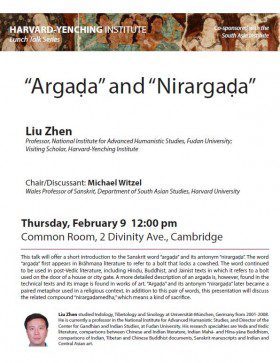Cosponsored Event
Liu Zhen, Professor, National Institute for Advanced Humanistic Studies, Fudan University; Visiting Scholar, Harvard-Yenching Institute
Chair/Discussant: Michael Witzel, Wales Professor of Sanskrit, Department of South Asian Studies, Harvard University
This talk will offer a short introduction to the Sanskrit word “argaḍa” and its antonym “nirargaḍa”. The word “argaḍa” first appears in Brāhmaṇa literature to refer to a bolt that locks a cowshed. The word continued to be used in post-Vedic literature, including Hindu, Buddhist, and Jainist texts in which it refers to a bolt used on the door of a house or city gate. A more detailed description of an argaḍa is, however, found in the technical texts and its image is found in works of art. “Argaḍa” and its antonym “nirargaḍa” later became a paired metaphor used in a religious context. In addition to this pair of words, this presentation will discuss the related compound “nirargaḍamedha,” which means a kind of sacrifice.
Liu Zhen studied Indology, Tibetology and Sinology at Universität-München, Germany from 2001-2008. He is currently a professor in the National Institute for Advanced Humanistic Studies, and Director of the Center for Gandhian and Indian Studies, at Fudan University. His research specialties are Veda and Vedic literature, comparisons between Chinese and Indian literature, Indian Mahā- and Hīna-yāna Buddhism, comparisons of Indian, Tibetan and Chinese Buddhist documents, Sanskrit manuscripts and Indian and Central Asian art.
Cosponsored with Harvard Yenching Institute

